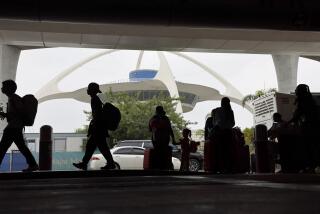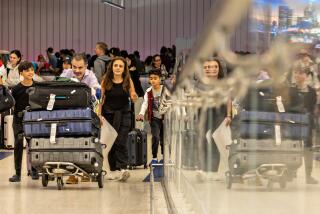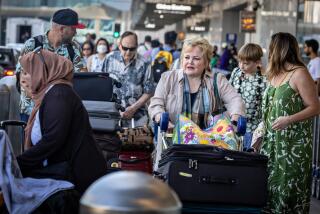Airline Passengers Are Delayed 2,000 Hours Daily, Study Shows
- Share via
WASHINGTON — U.S. airline passengers are stranded aboard airplanes for more than 2,000 hours every day, the Air Transport Assn. said Thursday, and half of the delays occur on the ground--but there may be fewer late flights during this summer’s peak travel season.
The industry lobbying group said airline passengers will take longer than ever to get to their destinations this summer, although they will arrive closer to the expected time because of more accurate time schedules.
Gabriel Phillips, the executive vice president of the Air Transport Assn., said airlines have stretched out thousands of flight schedules in response to government pressure to make them more realistic.
Phillips said the number of delays has declined 3% this year, but the statistic is deceptive because it was caused by the revised schedules.
Passengers nationwide are being delayed a total of more than 2,000 hours a day, the trade group said.
Air travelers are being slowed by an overtaxed air traffic control system and crowded airports, Phillips said.
“Some of what we have now are delays masquerading as revised schedules,” Phillips told reporters. “The point here is that the airlines would not have had to revise many of their schedules in the first place if we had a more modern and efficient system.”
The ATA released a study that showed nearly 50% of delays caused by the air traffic control system occur while aircraft are taxiing into takeoff position--suggesting a need for more airports and runways.
“Even though the number of delays has declined in the past year, this masks the inefficiencies being built into the airline schedules imposed by the lack of airport and airways capacity,” Phillips said.
The ATA, which represents the nation’s airlines, said delays caused by an overburdened air traffic control system cost the airline industry more than $2 billion a year, which is passed to consumers in the form of higher ticket prices.
More to Read
Inside the business of entertainment
The Wide Shot brings you news, analysis and insights on everything from streaming wars to production — and what it all means for the future.
You may occasionally receive promotional content from the Los Angeles Times.










